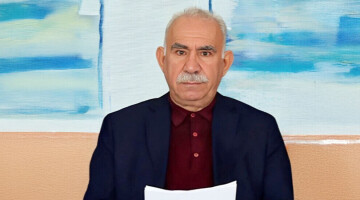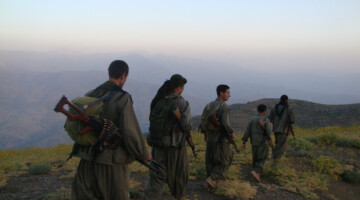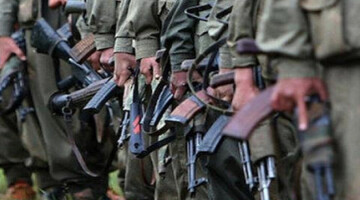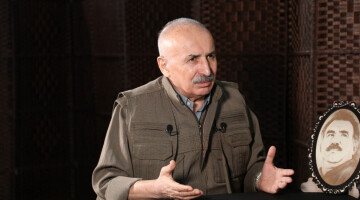Evaluating the Raqqa operation and the developments in Rojava and Northern Syria, KCK (Kurdistan Communities Union) Executive Council Co-President Cemil Bayık stated that the Turkish state bet on the wrong horse in Syria.
Bayık said the US and Russia do not want Turkey to enter Manbij, noting that the US doesn't trust Turkey with regard to their policy on Syria.
KCK Executive Council Co-President Cemil Bayık answered ANF's questions on the developments in Rojava, Northern Syria and Kurdistan. First part of the detailed interview is as follows:
What kind of a new page will the liberation of Raqqa by Syrian Democratic Forces turn over in Syria and how will this influence the balances of power in the country? What will be the political and diplomatic gains in the coming process?
There continues a major dispute over the Raqqa operation. Turkey will not be influential in its Syria policy unless it takes part and plays an effective role in the Raqqa operation. By having an effective part in the Raqqa operation, Turkey seeks to choke the Rojava revolution and increase its influence on Syria. In order to participate in the Raqqa operation, Turkey has resorted to all kinds of blackmailing to the US and the coalition forces. It also tried to benefit from the contradiction between the US and Russia, the US and Iran and Syria. However, due to the fact that Turkey's policies do not give much confidence, coalition forces did not lean towards Turkey's participation in such an important campaign.
On the other hand, Russia, Iran and Syria set eyes on Raqqa after the evacuation of the rebels in Aleppo. The most recent initiative on Palmyra is a part of this. However, Syrian Democratic Forces and coalition forces had launched the Raqqa operation previously, which resulted in them having the initiative on this campaign.
IMPORTANCE OF THE RAQQA OPERATION
For sure, the Raqqa operation is critical and it will have an impact on a large territory that involves Deir ez-Zor and extends up to the Iraqi border. In this regard, the Raqqa campaign bears the means to have influence on Syria in generaland on Iraq-Syria border, and thus to have an impact on Iraq's policies as well. From this point of view, a major struggle on the Raqqa operation continues. Turkey's aiming Shengal together with KDP is also related with the Raqqa campaign and with who will take east Syria under control. The gangs' attack on Shengal was kind of an attempt by Turkey to sabotage the coalition forces and SDF running the campaign together. Their goal was to stall SDF forces and thus to frustrate the Raqqa operation. However, these efforts did not yield results because SDF already have a remarkable force on the ground. Raqqa is already encircled from three fronts and ISIS activity takes place mainly on the southern and southeastern front.
Still, SDF forces that are in alliance with coalition forces in the Raqqa operation stay ahead of the game in consideration of the facts that the Northern Syria Federation is prevalent in significant areas up to the Iraqi border, and Shaddadi and Hawl is under the control of Northern Syria which is also in a position putting pressure on Deir ez-Zor
Turkey's impositions have not been accepted because Turkey entering Raqqa will mean the obstruction of a radical change in Raqqa. Turkey's engagement in Raqqa means an increase of the influence of undemocratic and anti-democratic fundamentalist gangs in Raqqa. In this regard, there exist quite significant political differences between the capture of Raqqa by Syrian Democratic Forces and its capture by Turkey or other forces, and this will also have different political consequences. It is important who will have control over Raqqa, and Turkey's non-participation in this campaign will restrict its influence on not only Raqqa but the rest of Syria as well, and this will strengthen the position of democratic forces in Syria in general.
Liberation of Raqqa by Syrian Democratic Forces will mainly mean securing the Democratic Northern Syria Federation at a significant level, and bring about the effectiveness of democratic forces on the border regions between Syria and Iraq. On this basis, this will ensure the emergence of a regime on a democratic basis in Syria. Syrian Democratic Forces growing stronger will mean the prevailing of democratic forces in Syria. Whether with an agreement or consensus, a change in Syria that will based on democratization will reveal the shaping of a new Syria. In this regard, it is important who will liberate Raqqa.
Undoubtedly, with the liberation of Raqqa ISIS will lose significant strength. With the weakening of ISIS, their place won’t be filled by forces that are slight variations of them, that Turkey tries to pass off as moderate. Maybe in the previous years these type of forces, the Islamic groups with the moderate veil, could have had an advantageous position, but with the passing years, their moderate Islamic approach has given way to not a democratic stance but a race with ISIS on who is more radical. Or maybe, ISIS gaining strength brought their character ever closer to ISIS. In this sense, both ISIS will lose strength and these religious, authoritarian groups will lose strength, however they may define themselves. Raqqa being liberated by the Syrian Democratic Forces will create such a situation. This way, support for a new approach for Syria that includes all differences based on the Syrian Democratic Forces’ Democratic Nation understanding will increase. The weight of the Syrian Democratic Forces and the coalition forces will increase. On the other hand, with ISIS broken, the regime’s authority around Damascus, Hama and Humus will increase. In this sense, the Syrian regime and Russia will have an effect on the balance. Thus, Iran will have a certain weight in that side as well. The Raqqa operation will create a certain relief for the regime as well.
How will Raqqa being liberated in an operation where the Syrian Democratic Forces are effective affect the forces fighting in the Middle East, Turkey and Syria fronts?
As the Raqqa operation will have effect on the democratization of Syria, it will also have a democratic impact on the Middle East. It will have a democratic impact on Iraq as well. The SDF’s gains in Raqqa will create these results, but the tension between Turkey and the SDF won’t subside. Raqqa achieving a democratic character will expose Turkey’s fascist authoritarian character even more. Then Turkey will either have to democratize, or it will continue to cause problems in Syria in various ways. With this aspect, the democratization struggle in Syria will, in a sense, turn into the democratization struggle for Turkey in the axis of tension between Turkey and the SDF. It already has such character. The struggle between Turkey and the SDF continues on two bases: First, the Turkish state’s continued denial of Kurds, in this sense they don’t want the Kurds to achieve any gains, thus the conflict continues. On the other hand, it continues as a conflict between the forces of democracy and anti-democratic forces. Because Turkey is not democratic, because it is an authoritarian hegemonic regime, it wants those close to his mindset to settle in al-Bab and Manbij and to control Raqqa. This is one of the reasons they want to be included in the Raqqa operation. In truth, they are waging a struggle against democracy. Because where they have influence, the control of democratic forces will weaken, and religious, nationalist, anti-democratic forces allied with them will gain strength. Turkey continues their domestic fight against democracy in Syria as well. They want to make the Islamic-masked authoritarian groups allied to them control Syria and thus create influence for themselves in Syrian and Middle Eastern politics. Viewed from this framework, the SDF winning in Raqqa and liberating Raqqa will deal a great blow to not only the authoritarian hegemonic politics Turkey carries out now, their search to build a system and their search to continue the status quo, but also the attempts to continue the anti-Kurdish, anti-democratic and authoritarian system to prevail in the Middle East. But until Turkey is democratized, they will continue to sabotage this democratization process in Syria in various ways.
"IF RAQQA IS LIBERATED BY THE SDF, TURKEY’S INFLUENCE WILL WANE"
After Raqqa is liberated by the SDF, Turkey’s discourse of “PYD is a terrorist organization, the Democratic Northern Syrian Federation is under the influence of terrorists” will lose traction. Because when Raqqa is taken, it will be better understood that the problem is not the Kurds just having control over this or that location. Everybody will see that the issue is to strive for the Democratic Syria that includes the Kurds, the Arabs, and all Syrian groups. In this sense, the Democratic Northern Syrian Federation’s position will improve both against Turkey, and against Syria, and against Russia and Iran, and the coalition forces. The coalition forces will show regard mainly to the Democratic Northern Syrian Federation and the Syrian Democratic Forces. There won’t be these negotiating with different forces or these disputes. The hesitant, ambivalent, in-between policies of will they stand with Turkey or the democratic forces will be abandoned. Because up to now, the policy was to build relationships with the SDF on one hand and entertain Turkey and turn a blind eye to some of their demands on the other. Turkey entering Jarablus and turning towards al-Bab, their attacks on Manbij, and their many attacks on the Democratic Northern Syrian Federation were results of the coalition forces carrying out hesitant policies that tried to please everyone. But after Raqqa is taken, the Democratic Northern Syrian Federation Forces will have a stronger hand against everyone.
The developments around al-Bab and Manbij are also interesting. Nearly all forces have taken up positions there. The Turkish state is attacking villages and say that they will enter Manbij. What do you think of this situation in the region?
It is known why Turkey wants to enter the area between Kobanê and Efrîn. They aim to cut off relationships between the Efrîn canton and Kobanê. They don’t want the disconnect between cantons to be fixed, on the contrary, they want to position themselves in between two cantons to remove the gains of the Democratic Northern Syrian Federation and the Kurds. So, they entered here, in exchange of letting Aleppo go. Turkey entering Jarablus and pushing against al-Bab is the result of the Aleppo negotiations. It has happened by Russia turning a blind eye. And the US stood silent because of their relationship with Turkey. In a way, the US used the threat of the Turk to make the Kurds come closer to the line they wanted. So, with Russia, Iran and Syria turning a blind eye, and the US turning a blind eye, Turkey entered Jarablus and took some areas of al-Bab. This is Turkey’s goal, and they want to increase their influence by taking Manbij too. Then from there they will try to develop the Raqqa imposition. That is Turkey’s approach.
"THE US DOESN’T TRUST TURKEY IN ITS SYRIAN POLICY"
The US, meanwhile, doesn’t see Turkey as stable in its Syria policies. They don’t trust Turkey’s approaches. Also, as they are a foreign power, too much intervention from them on the Syria field will intensify the issues and complicate them even further. They are also concerned that Turkey will go into an approach that disrupts their own policies. For this reason, they didn’t want Turkey to enter Manbij. On the other hand, Russia, the Regime and Iran didn’t want Turkey entering Manbij either. Because they know that once Turkey enters a place, they don’t just up and leave. They know that Turkey will use the places they take as political pressure. Even though Turkey says that they are against terrorism and for Syrian unity, that they will ‘return the keys to Syria’ when the time comes, neither Syria, nor Russia nor Iran believe this. Because what policy Turkey will take on when is unknown. Nobody trusts Turkey anymore. In this sense, they didn’t want Turkey to have influence in Manbij either. On the other hand, they are also searching for a compromise with the Democratic Northern Syrian Federation, they don’t want to be completely at odds. They don’t want to stand too far from the Democratic Northern Syrian Federation forces. As they know a conflict between them and the Democratic Northern Syrian Federation won’t serve their interests, they didn’t accept Turkey entering Syria, they were opposed. In this sense, Russia, Iran, Syria and the US were against Turkey entering Syria, they didn’t accept it.
"MANBIJ CAN’T BE EXPECTED TO BE LEFT FOR TURKEY"
On the other hand, if Turkey had attempted to enter Manbij, the Democratic Northern Syrian Federation forces and peoples of the region would enter a war with Turkey. SDF forces wouldn’t accept the Turkish invasion. Because they had hundreds of martyrs and close to a thousand people were wounded when Manbij was taken, and it is unthinkable that they will evacuate Manbij to leave it to Turkey’s allied gangs. It is out of the question for some external force to go there, achieve control and govern that city as Turkey says. Manbij is governed by the people of Manbij. The situation isn’t that ‘the Kurds went and pushed out Arabs and Turkmens’. Whoever lives in the city, they are part of the administration. Arabs are the majority, but there are Kurds and Turkmens and Chechens. The Arabs are the majority in al-Bab and Manbij, but after the Arabs, Kurds are the majority in numbers. The issue there isn’t a ‘will Kurds or Arabs have control’. It is an issue of whether democratic forces will have control over Manbij, or authoritarian, nationalist, fanatical, Islam-masked forces who are allied with the Turkish state? The democratic forces of Manbij have weight there, and Arabs are the majority in the government. But Turkey doesn’t see the issue as the Arabs governing. Which Arabs will govern? The democratic ones, or the anti-democratic, religious and nationalist groups allied with them? That is Turkey’s imposition. Turkey’s imposition in Raqqa, in Manbij, in al-Bab is like this. They want to crush the democratic forces and to make anti-democratic forces take control! This signifies an attack on the democratization of Syria. Coalition forces and everybody else must be seeing this.
"IF IT WASN’T FOR RUSSIA AND THE US, THERE WOULD BE SERIOUS CLASHES IN MANBIJ"
If the US and Russia didn’t intervene there, there would be serious clashes there right now. There would be a war with the Turkish state. And when this war intensified, the forces to carry out the Raqqa operation would be concentrated away from Raqqa and on this conflict. The US didn’t want that, and intervened. Because the US also knows that there is a people’s assembly in Manbij and they are in charge. Turkey wants them gone, and their allied gangs to replace them! Fundamentalist religious groups! Who will benefit there? Neither the US, the coalition forces, Russia or the regime would want that. The situation in Manbij needs to be handled in this framework. If Turkey continues their impositions, it will be a battlefield between the SDF and Turkey, and that will turn into a swamp for Turkey. Maybe Russia isn’t too rough right now, or the US, but if Turkey increases their imposition, if the violence escalates, everybody’s stance against Turkey will be clear, and Turkey will be the losing side in that situation.
Has Turkey taking al-Bab with the blind eye from some forces and their agreement with ISIS increased their influence in Syria in the current equation? Do you believe Turkey can be permanent in the region?
Everybody knows how Turkey took al-Bab. And not even the whole of al-Bab. Al-Bab is a whole, along with her surroundings. That surrounding area is not fully under Turkey’s control. But, they have entered the al-Bab center. Just like ISIS left Jarablus according to their deal, in al-Bab they first resisted, but then because the Turkish state had suffered so many losses, and because ISIS needed strength due to the Raqqa operation, Turkey and ISIS struck a deal and ISIS left al-Bab for Turkey. If ISIS had resisted, Turkey wouldn’t be able to enter there. The Turkish state had experienced a breaking of their will in al-Bab before. It can’t be said that taking al-Bab increased Turkey’s influence in Syria. Actually, the process of turning a blind eye to these parts and neutralizing Turkey’s allied gangs in other areas has started. Presumably, in the near future Turkey’s allied gangs will be pushed out of Idlib as well. Or Syria, Iran and Russia will push Turkey on al-Bab and Jarablus. Aleppo, which could have created more influence for Turkey in Syria, has been lost. Because if you have Aleppo, you can have influence in its surroundings. Otherwise, it is not possible to have influence in that area by taking al-Bab. In this sense, Turkey’s influence in Syria hasn’t increased.













